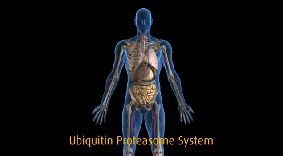In Arabidopsis, like in all other eukaryotes, most of the intracellular proteolysis is controlled by the ubiquitin/26S proteasome system (UPS). Protein degradation via this pathway is complex, specific and tightly regulated. Proteins targeted for degradation by the UPS are covalently modified with a polyubiquitin chain by a three-step enzymatic process and are then recognized by the 26S proteasome and degraded into peptides. The UPS has two main functions. The UPS removes misfolded, oxidized and damaged proteins which - if not removed promptly - can aggregate and become toxic for the cell. The first function is thus essential for housekeeping and stress defense. The UPS also conditionally degrades activator and repressor proteins of various signal transduction pathways. In response to external or internal stimuli, many regulatory proteins undergo post-translational modifications (e.g. phosphorylation) that either prevent or trigger their attachment to ubiquitin and their stabilization or accelerated degradation. This second function is described as regulatory or conditional proteolysis. Plant proteasome reviews: ![]()
26S PROTEASOME & CYTOKININ SIGNALING
We are analyzing the proteasome-dependent steps in cytokinin signaling by identifying the target proteins and the mechanisms that control their ubiquitination and delivery to the 26S proteasome. Cytokinin signaling reviews: ![]()
26S PROTEASOME & STRESS TOLERANCE
We aim to understand how protein degradation controls plant growth and development under normal and stress conditions. Currently, we are analyzing:
1. Proteasome targets that mediate cortical microtubule array restructuring in plants. Microtubules in plants:
2. Proteasome-dependent regulation in the uptake, distribution and fate of titanium dioxide nanoparticles in Arabidopsis thaliana. Nanoparticles and plants:
3. Proteasome-dependent degradation of stress-induced enzymes of the flavonoid biosynthetic pathway. Flavonoid biosynthesis:
26S PROTEASOME & RECOMBINANT PROTEIN YIELDS
Plants are recombinant protein production systems with many advantages over microbial or mammalian cell culture systems. However, the use of plant systems for the economic production of recombinant proteins is often hampered by the low yields of heterologous proteins. We are testing the role of proteasome-dependent proteolysis in the reduction of recombinant protein levels in planta. Proteolysis of recombinant proteins: ![]()
